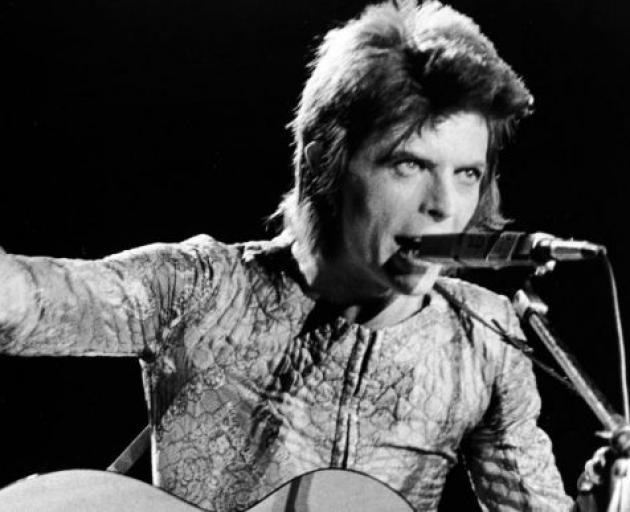
The world's greatest dilettante, a musical magpie who shed personas and styles at will, David Bowie has left a formidable back catalogue, albeit one that has prompted much conjecture over which moments were his best. Music reviewers Mark Orton, Shane Gilchrist and John Hayden go rummaging through rock history in an effort to find their favourite Bowie albums.
Hunky Dory (1971)
Though, as a curious 12-year-old I convinced my parents to listen to the 1983 concert from outside the gates.
As the sounds of the Serious Moonlight tour drifted out of the stadium, something must have stuck.
Weeks later, ferreting about in the second-hand record shops of St Kevin's Arcade, I decided to take a punt on an album called Hunky Dory.
So it began.
Hunky Dory transported me from being a fan of Bowie's six-string slingers (and there have been some great ones) to a fan of the man himself.
Coming of age musically in the 1980s meant that Bowie's presence was always felt, but nothing on Hunky Dory sounded like anything Bowie was doing in his so-called "pop-era''.
What it did was channel my listening away from over-produced vacuous nonsense and a plethora of forgettable hair-metal bands.
Hunky Dory is chock-full of androgynous ambivalence, quirky folk tunes, notable cultural and musical influences.
From the moment that the infectious stutter of Changes opens the album, Hunky Dory transported me to a place that my staid ears had not experienced.
From marvelling over the arrangement of Oh You Pretty Things to trying to figure out the tricky acoustic riff that introduces Andy Warhol, this was a piece of vinyl that needed some serious listening space and a good set of headphones.
Produced by long-time Bowie collaborator Tony Visconti, Hunky Dory is also notable for being the first recording to feature all members of the Spiders from Mars.
It was a revelation to hear Mick Ronson's gloriously fuzzy tone, Rick Wakeman's piano and, riding above it all, Bowie's unique vocal dexterity.
Trying to single out a favourite track is not easy, but for me it's a close call between the Velvet Underground-inspired Queen Bitch and the charming folk ballad that builds to a sexually seductive crescendo in The Bewlay Brothers.
We were so turned on, indeed.
I'll never get to know what it sounded like when released in 1971, or what it would have been like to experience Bowie the performer but, as with any album that becomes part of the family, I've grown with it and am occasionally transported to another dimension.
- Mark Orton
The Rise and Fall of Ziggy Stardust and the Spiders from Mars (1973)
Within a Fibrolite house in South Auckland, my 5-year-old ears first heard the glistening, perfectly timed 12-string chords to that breakthrough single.
I likely didn't know what time it was (and perhaps the lights were low) as this cat laid down some rock 'n' roll (11 songs in total) that would later be hailed as a seminal moment in pop music history.
As various critics have noted over the years, Ziggy Stardust succeeds not in spite of Bowie's pretensions but because of them.
Yet within the concept of a friendly being who arrives from outer space, there beats a prescient heart: from the folkish opener, Five Years, which tells of a world on the brink of environmental collapse, to the title track, which examines notions of fame and its inherent dangers.
Much of the focus has been on the album's glam-rock highlights - and, yes, there are plenty to choose from (Moonage Daydream, Ziggy and Suffragette City are just a few) - yet it's the contrasts of intimate warmth provided by Five Years, Soul Love, and closer Rock & Roll Suicide that confirm this is an effort that's all killer, no filler.
To quote a Circus critic on its release, Ziggy Stardust is "not your everyday sort of album, but an album for every day''.
And I haven't even mentioned Lady Stardust.
Long live such animal grace.
- Shane Gilchrist
If 1976 had turned out to be David Bowie's swansong, his legacy would have remained monumental: good ol' London boy David Jones, Major Tom, The Thin White Duke, The Man Who Fell to Earth, and of course, Ziggy Stardust.
Fortunately, he forged ahead, and with his greatest release laid the blueprint for art-rock, new wave, industrial, and ambient music in one fell swoop.
Low was influenced by the icy electronic textures of German synth-pioneers Kraftwerk and Neu!.
Its notoriety stems from its synthetic sound, a futuristic warble far removed from the giddy glam stomp and blue-eyed soul that pervaded Aladdin Sane and Young Americans.
Opener Speed of Life whizzes by sans vocals, a nod to the Teutonic "motorik'' music of his influences, but more significantly, acceptance that its creator was undergoing personal ch-ch-ch-ch-changes.
Bowie headed to Europe to escape the decadence of the Los Angeles celebrity scene - and the cocaine-fuelled paranoia that had haunted him since 1975 - in the midst of the disintegration of his marriage.
As such, Low is built on sickness, dislocation, escapism yet, ultimately, hope.
The stark soundscapes of the album's famed instrumental half reinforce such concerns.
Conceived as "tone poems'' rather than traditional "songs'', the pieces reflect the desolation of the artist; the monochrome austerity of Warszawa, Weeping Wall and Subterraneans provide an insight into Bowie's frame of mind.
A New Career in a New Town, with its sprightly harmonica and synth treatments, presents a heightened sense of optimism, reinforcing the old adage that from rock bottom, the only way is up.
It helps that the ambient burbling was buttressed by his most vulnerable and humane lyricism.
Sound and Vision pulls the oldest trick in the pop handbook; a pretty little ditty, whose girl-group "doo-doo-doos'' sugarcoat the feelings of isolation and depression contained within ("pale blinds drawn all day/nothing to do/nothing to say'').
Elsewhere, the astonishing Breaking Glass writhes with brutal honesty ("You're such a wonderful person/but you got problems''), while Always Crashing in the Same Car - voicing frustration at making the same mistakes over again - asserts that he's fed up with going "round and round''.
Thanks to Low, Bowie clawed his way back from the personal abyss, electronic music was no longer viewed as the domain of pompous supergroups, and it afforded him our forgiveness for future transgressions, like sporting that codpiece in Labyrinth.
Sort of.
- John Hayden












